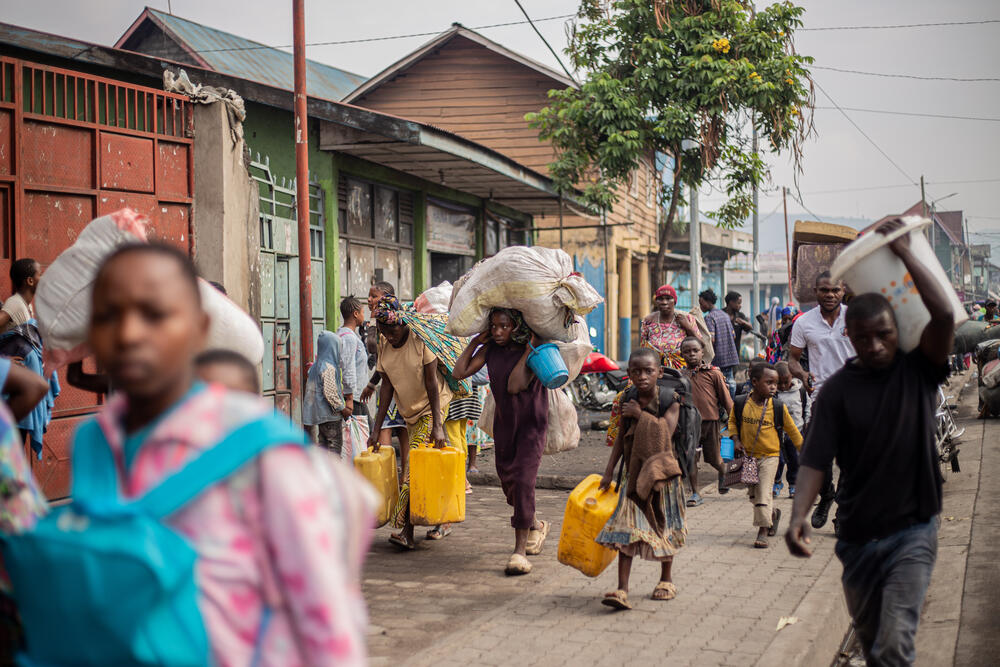M23’s Advance in DRC Threatens Business and Security in the Region

Image: Medecins Sans Frontieres – Jospin Mwisha
The Democratic Republic of Congo (DRC) is at a tipping point. The March 23 Movement (M23) has escalated its offensive in the east, capturing key cities like Goma and Bukavu, and leaving a trail of devastation in its wake. With over 7.2 million displaced and 6 million facing food insecurity, the humanitarian crisis is dire to say the least. Looming overhead is also the potential for destabilisation of one of Africa’s most resource-rich regions, with far-reaching implications for international businesses, organizations, and regional security.
For companies operating in or sourcing from the DRC, the risks are rising. North Kivu (now under M23’s de facto control) is seen above all as a mineral treasure trove, to the expense of those that call the area home. The area is rich in coltan, tungsten, and cassiterite, critical for global electronics supply chains. It’s well known these minerals are essential for producing smartphones, laptops, and electric vehicles, making the DRC a key part in the global tech industry. Yet, these resources are increasingly exploited through illegal networks linked to M23 and its alleged backer, Rwanda. The Congolese government accuses Rwanda of using the group to create a buffer zone, further complicating an already volatile situation.
This isn’t the first time the DRC’s mineral wealth has fuelled conflict and disrupted global supply chains. During the late 1990s and early 2000s, the country was embroiled in the Second Congo War, often called the “African World War” due to the involvement of nine African nations and numerous armed groups. The conflict, driven by competition over the DRC’s vast resources, resulted in an estimated 6 million deaths and caused significant disruptions to the global supply of coltan and other minerals.
The fallout was felt worldwide. In the early 2000s, a coltan shortage, exacerbated by the DRC’s instability, led to skyrocketing prices and forced tech companies to scramble for alternatives. Today, with the DRC accounting for over 60% of the world’s cobalt supply and a significant share of coltan, the stakes are even higher. M23’s control of mining areas and illegal export networks threatens to repeat this history, putting global supply chains at risk once again.
Broader Challenges in Africa: A Region on the Brink
The DRC is not alone in facing instability. Across Africa, conflicts are flaring up, threatening to destabilize entire regions. In Sudan, a brutal civil war between the Sudanese Armed Forces (SAF) and the Rapid Support Forces (RSF) has displaced over 8 million people and created a humanitarian catastrophe. Like the DRC, Sudan’s conflict is fuelled by competition over resources, ethnic divisions, and the involvement of external actors. Both conflicts highlight the fragility of state structures and the ease with which regional tensions can escalate into full-blown crises.
These conflicts are interconnected. The DRC and Sudan are part of a broader pattern of instability in Central and East Africa, where weak governance, competition over resources, and ethnic rivalries create fertile ground for violence. The involvement of external actors, such as Rwanda’s alleged support for M23 or foreign mercenaries in Sudan, further complicates the picture. This raises the risk of regional destabilization, as conflicts spill over borders and draw in neighbouring countries.
Regional and Geopolitical Implications
The DRC’s conflict has already heightened tensions between the DRC and Rwanda, with the UN accusing Rwanda of deploying up to 4,000 troops to support M23. Meanwhile, the killing of 14 Southern African Development Community (SADC) peacekeepers in Goma has heightened rivalries between South Africa and Rwanda, raising concerns of a broader regional crisis.
For international organisations, the stakes are equally high. The DRC’s instability undermines efforts to address one of the world’s largest humanitarian crises, with millions displaced and food insecurity rampant. The lack of a coherent international response (beyond calls for a ceasefire, which are lacklustre) leaves a vacuum that could prolong the conflict and deepen its impact.
Why This Matters
The DRC’s turmoil isn’t just a regional issue, it’s a global concern. For businesses, the risks include disrupted supply chains, increased operational costs, and heightened security threats. For organizations, the challenges range from safeguarding personnel to navigating complex geopolitical dynamics.
ICE24 specialises in helping you navigate these risks. Risk & Threat Assessments provide an in-depth analysis of security threats and actionable recommendations to protect your operations. With our Real-Time Alerts, you gain immediate access to critical information, enabling you to respond proactively to emerging threats.
Contact us to explore how you can stay ahead of the pulse and protect your interest and assets: [email protected]
